简明英国文学史
- 格式:pptx
- 大小:358.48 KB
- 文档页数:26
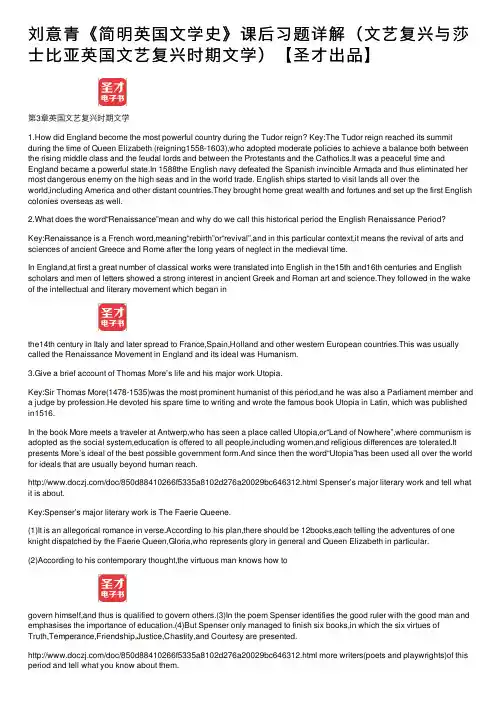
刘意青《简明英国⽂学史》课后习题详解(⽂艺复兴与莎⼠⽐亚英国⽂艺复兴时期⽂学)【圣才出品】第3章英国⽂艺复兴时期⽂学1.How did England become the most powerful country during the Tudor reign? Key:The Tudor reign reached its summit during the time of Queen Elizabeth (reigning1558-1603),who adopted moderate policies to achieve a balance both between the rising middle class and the feudal lords and between the Protestants and the Catholics.It was a peaceful time and England became a powerful state.In 1588the English navy defeated the Spanish invincible Armada and thus eliminated her most dangerous enemy on the high seas and in the world trade. English ships started to visit lands all over theworld,including America and other distant countries.They brought home great wealth and fortunes and set up the first English colonies overseas as well.2.What does the word“Renaissance”mean and why do we call this historical period the English Renaissance Period? Key:Renaissance is a French word,meaning“rebirth”or“revival”,and in this particular context,it means the revival of arts and sciences of ancient Greece and Rome after the long years of neglect in the medieval time.In England,at first a great number of classical works were translated into English in the15th and16th centuries and English scholars and men of letters showed a strong interest in ancient Greek and Roman art and science.They followed in the wake of the intellectual and literary movement which began inthe14th century in Italy and later spread to France,Spain,Holland and other western European countries.This was usually called the Renaissance Movement in England and its ideal was Humanism.3.Give a brief account of Thomas More’s life and his major work Utopia.Key:Sir Thomas More(1478-1535)was the most prominent humanist of this period,and he was also a Parliament member and a judge by profession.He devoted his spare time to writing and wrote the famous book Utopia in Latin, which was published in1516.In the book More meets a traveler at Antwerp,who has seen a place called Utopia,or“Land of Nowhere”,where communism is adopted as the social system,education is offered to all people,including women,and religious differences are tolerated.It presents More’s ideal of the best possible government form.And since then the word“Utopia”has been used all over the world for ideals that are usually beyond human reach./doc/850d88410266f5335a8102d276a20029bc646312.html Spenser’s major literary work and tell what it is about.Key:Spenser’s major literary work is The Faerie Queene.(1)It is an allegorical romance in verse.According to his plan,there should be 12books,each telling the adventures of one knight dispatched by the Faerie Queen,Gloria,who represents glory in general and Queen Elizabeth in particular.(2)According to his contemporary thought,the virtuous man knows how togovern himself,and thus is qualified to govern others.(3)In the poem Spenser identifies the good ruler with the good man and emphasises the importance of education.(4)But Spenser only managed to finish six books,in which the six virtues of Truth,Temperance,Friendship,Justice,Chastity,and Courtesy are presented./doc/850d88410266f5335a8102d276a20029bc646312.html more writers(poets and playwrights)of this period and tell what you know about them.Key:(List out some writers in this period and introduce their lives and major works according to the textbook.)6.What are Bacon’s chief contributions?Key:Bacon’s chief contributions are that he wrote many significant works,which have become great wealth of human being.7.Who was the greatest playwright before Shakespeare?Discuss one of his plays. Key:Christopher Marlowe was the greatest playwright before Shakespeare.The Tragical History of Dr.Faustus,written in blank verse,is Marlowe’s masterpiece.The story is taken from a medieval German legend,but Marlowe emphasizes humanistic ideals through Faustus’pursuits.Fed up with the four subjects of medieval knowledge(theology,philosophy,medicine and law),he turns to magic to seek the supernatural.Finally he succeeds in raisingMephistophilis,the Devil’s servant and strikes a contract with him,by which Mephistophilis will satisfy his desires such as conjuring the spirit of Alexander the Great in a king’s court,marrying Helen of Greece,and so on.And in exchange for all these services done for him,he agrees to sell his soul to the Devil.He goes through endless spiritual and moral struggles between good and evil during his transaction with Mephistophilis.But,he also shows the Renaissance human spirit of pursuing knowledge and infinite power,as well as the courage to challenge fate and authority.Although Marlowe’s drama lacks variety of characterisation and construction,his success with the blank verse and his mighty dramatic lines mark him as the most important predecessor of Shakespeare.8.What kind of comedy is Ben Jonson’s special contribution?And as a playwright how different is Ben Jonson from Shakespeare?Key:“Comedy of humours”is Ben Jonson’s special contribution.He forms a nice contrast to Shakespeare.(1)Jonson’s theory of“humours”reduces his characters to types,who represent greed,vanity,falsehood,etc.They are flat,one-sided and have no development.Unlike him,Shakespeare digs deep into human nature and depicts the complexities of human relations.(2)Ben Jonson advocates classic Roman and Greek masters,strictly observes the three unities and disapproves of any mixture of the tragic with the comic,while Shakespeare creates according to his own judgment and the taste of the audience,and is very flexible in his handling of drama rules set by hispredecessors.Their differences were so obvious that later Samuel Johnson described one as the poet of art and the other as the poet of nature.However,Jonson could not but see the great talent in Shakespeare,and as a good playwright and a learned man himself,he also admired his rival.。
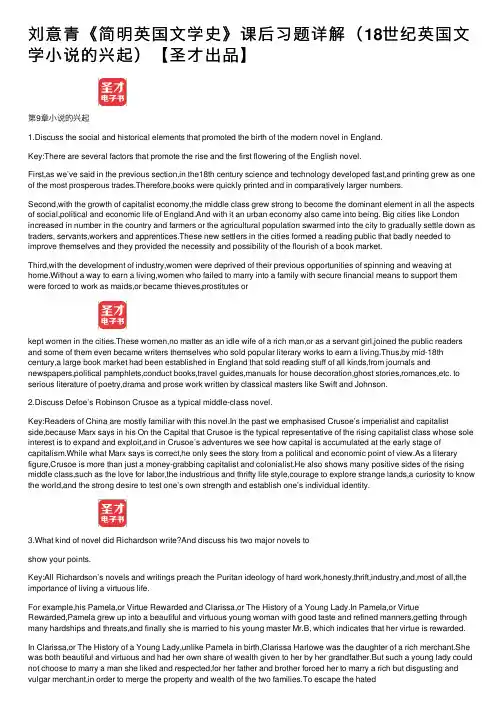
刘意青《简明英国⽂学史》课后习题详解(18世纪英国⽂学⼩说的兴起)【圣才出品】第9章⼩说的兴起1.Discuss the social and historical elements that promoted the birth of the modern novel in England.Key:There are several factors that promote the rise and the first flowering of the English novel.First,as we’ve said in the previous section,in the18th century science and technology developed fast,and printing grew as one of the most prosperous trades.Therefore,books were quickly printed and in comparatively larger numbers.Second,with the growth of capitalist economy,the middle class grew strong to become the dominant element in all the aspects of social,political and economic life of England.And with it an urban economy also came into being. Big cities like London increased in number in the country and farmers or the agricultural population swarmed into the city to gradually settle down as traders, servants,workers and apprentices.These new settlers in the cities formed a reading public that badly needed to improve themselves and they provided the necessity and possibility of the flourish of a book market.Third,with the development of industry,women were deprived of their previous opportunities of spinning and weaving at home.Without a way to earn a living,women who failed to marry into a family with secure financial means to support them were forced to work as maids,or became thieves,prostitutes orkept women in the cities.These women,no matter as an idle wife of a rich man,or as a servant girl,joined the public readers and some of them even became writers themselves who sold popular literary works to earn a living.Thus,by mid-18th century,a large book market had been established in England that sold reading stuff of all kinds,from journals and newspapers,political pamphlets,conduct books,travel guides,manuals for house decoration,ghost stories,romances,etc. to serious literature of poetry,drama and prose work written by classical masters like Swift and Johnson.2.Discuss Defoe’s Robinson Crusoe as a typical middle-class novel.Key:Readers of China are mostly familiar with this novel.In the past we emphasised Crusoe’s imperialist and capitalist side,because Marx says in his On the Capital that Crusoe is the typical representative of the rising capitalist class whose sole interest is to expand and exploit,and in Crusoe’s adventures we see how capital is accumulated at the early stage of capitalism.While what Marx says is correct,he only sees the story from a political and economic point of view.As a literary figure,Crusoe is more than just a money-grabbing capitalist and colonialist.He also shows many positive sides of the rising middle class,such as the love for labor,the industrious and thrifty life style,courage to explore strange lands,a curiosity to know the world,and the strong desire to test one’s own strength and establish one’s individual identity.3.What kind of novel did Richardson write?And discuss his two major novels toshow your points.Key:All Richardson’s novels and writings preach the Puritan ideology of hard work,honesty,thrift,industry,and,most of all,the importance of living a virtuous life.For example,his Pamela,or Virtue Rewarded and Clarissa,or The History of a Young Lady.In Pamela,or Virtue Rewarded,Pamela grew up into a beautiful and virtuous young woman with good taste and refined manners,getting through many hardships and threats,and finally she is married to his young master Mr.B, which indicates that her virtue is rewarded. In Clarissa,or The History of a Young Lady,unlike Pamela in birth,Clarissa Harlowe was the daughter of a rich merchant.She was both beautiful and virtuous and had her own share of wealth given to her by her grandfather.But such a young lady could not choose to marry a man she liked and respected,for her father and brother forced her to marry a rich but disgusting and vulgar merchant,in order to merge the property and wealth of the two families.To escape the hatedmarriage,Clarissa,inexperienced and innocent,fell into the hands of a rake Mr.Lovelace and was deceived and kidnapped to a brothel,and later drugged and raped.Although afterwards Lovelace realised his true feelings for Clarissa and proposed marriage,the virtuous girl could neither forgive him nor herself for harboring illusions toward a rake.Finally,she sought a slow suicidal death and wrote her own story as a warning to all the young women.4.How did Fielding name his panoramic novels?What are the main features of his novels?Key:Fielding named his panoramic novels“comic epic in prose”.Epics are usually written in verse,and the subjects are always adventures and heroic deeds of the heroes of noble birth.But here Fielding tells us that he has written a prose work with the epic scope and power,but the main protagonists are common people and even people of the low social status.This is a real revolution in the Western literary history in which literary genres abide by a rather strict rule of levels of style.Although Parson Adams and Joseph are still comic roles,they are no longer minor characters,but the centre of the story.In this experiment of Fielding’s,the new novel has paved way to the more realistic representation of common people’s experiences in the19th century.5.Why do we say that Tristram Shandy is a strange and difficult novel?In what way does this novel anticipate the postmodern novel tendencies?Key:We have several reasons to call Tristram Shandy experimental and difficult. First,it is perhaps the first English novel that does not respect the plot’s time sequence.Second,the book is made difficult by Sterne with a lot of typographical oddities.And third,he has employed a lot of sexual jokes such as his own unfortunate accidents during his mother’s conception of him and later the doctor’s crushing of his nose.Sterne is the first novelist who anticipates the postmodern violation of the temporal sequence of a narrative.。
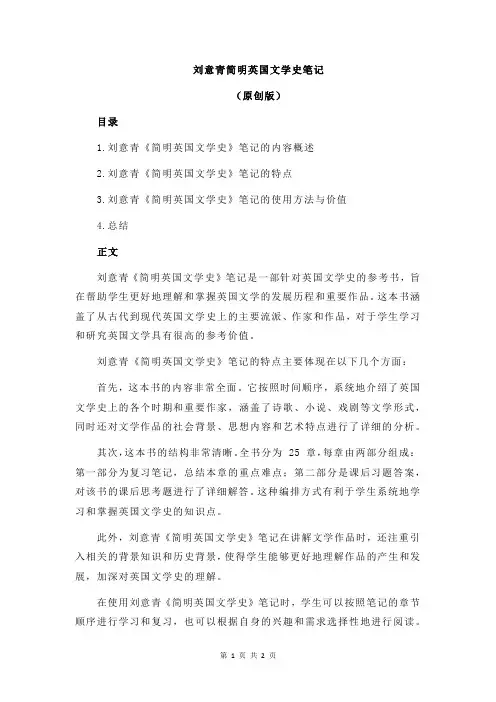
刘意青简明英国文学史笔记
(原创版)
目录
1.刘意青《简明英国文学史》笔记的内容概述
2.刘意青《简明英国文学史》笔记的特点
3.刘意青《简明英国文学史》笔记的使用方法与价值
4.总结
正文
刘意青《简明英国文学史》笔记是一部针对英国文学史的参考书,旨在帮助学生更好地理解和掌握英国文学的发展历程和重要作品。
这本书涵盖了从古代到现代英国文学史上的主要流派、作家和作品,对于学生学习和研究英国文学具有很高的参考价值。
刘意青《简明英国文学史》笔记的特点主要体现在以下几个方面:首先,这本书的内容非常全面。
它按照时间顺序,系统地介绍了英国文学史上的各个时期和重要作家,涵盖了诗歌、小说、戏剧等文学形式,同时还对文学作品的社会背景、思想内容和艺术特点进行了详细的分析。
其次,这本书的结构非常清晰。
全书分为 25 章,每章由两部分组成:第一部分为复习笔记,总结本章的重点难点;第二部分是课后习题答案,对该书的课后思考题进行了详细解答。
这种编排方式有利于学生系统地学习和掌握英国文学史的知识点。
此外,刘意青《简明英国文学史》笔记在讲解文学作品时,还注重引入相关的背景知识和历史背景,使得学生能够更好地理解作品的产生和发展,加深对英国文学史的理解。
在使用刘意青《简明英国文学史》笔记时,学生可以按照笔记的章节顺序进行学习和复习,也可以根据自身的兴趣和需求选择性地进行阅读。
同时,笔记中的课后习题答案可以帮助学生检验自己的学习成果,及时发现和弥补自己的知识漏洞。
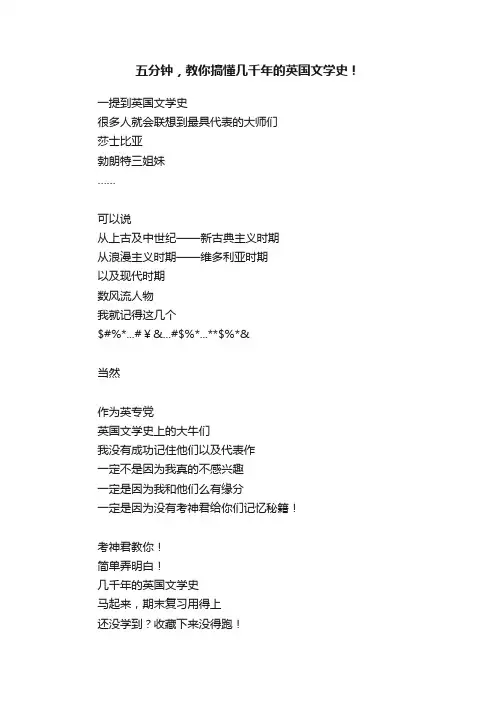
五分钟,教你搞懂几千年的英国文学史!一提到英国文学史很多人就会联想到最具代表的大师们莎士比亚勃朗特三姐妹……可以说从上古及中世纪——新古典主义时期从浪漫主义时期——维多利亚时期以及现代时期数风流人物我就记得这几个$#%*...#¥&...#$%*...**$%*&当然作为英专党英国文学史上的大牛们我没有成功记住他们以及代表作一定不是因为我真的不感兴趣一定是因为我和他们么有缘分一定是因为没有考神君给你们记忆秘籍!考神君教你!简单弄明白!几千年的英国文学史马起来,期末复习用得上还没学到?收藏下来没得跑!英国文学主要分五个阶段:①②上古及中世纪的英国文学③新古典主义时期④浪漫主义时期⑤维多利亚时期以及现代时期古英语时期古英语时期从1066年诺曼人征服英国,到1500年前后伦敦方言发展成为公认的现代英语。
文学作品主要的形式有骑士传奇,民谣和诗歌。
在几组骑士传奇中,有关英国题材的是亚瑟王和他的圆桌骑士的冒险故事,其中《高文爵士和绿衣骑士》代表了骑士传奇的最高成就。
中世纪文学中涌现了大量的优秀民谣,最具代表性的是收录在一起的唱咏绿林英雄罗宾汉的民谣。
最重要的诗人是被称为'英国诗歌之父'的乔叟,代表作是《坎特伯雷故事集》,取得了很高的艺术成就。
他首创了诗歌的双韵体,每两行压韵的五步抑扬格,后被许多英国诗人采用。
乔叟用伦敦方言写作,奠定了用英语语言进行文学创作的基础,促进了英语语言文学的发展。
文艺复兴时期文艺复新时期,是中世纪的结束和现代社会的开始,是从十五世纪到十七世纪,人文主义是其精神所在,那个时期涌现的作家有莎士比亚,培根,马洛,斯宾塞,约翰弥尔顿。
文艺复兴时期的英国文学得到了空前的发展,在诗歌,散文和戏剧方面尤其兴盛。
诗歌方面,新的诗体形式如十四行诗,无韵体诗被介绍到英国。
重要的诗人有Philip Sidney,他不仅写了许多优美的十四行诗,还创作了最早的诗歌理论作品之一《诗辩》。
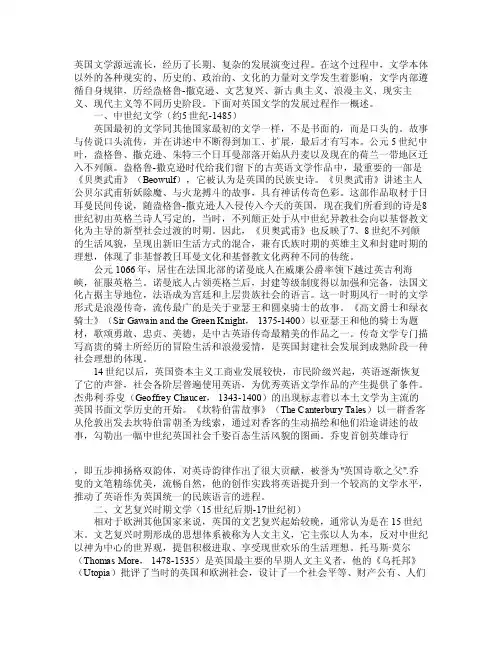
英国文学源远流长,经历了长期、复杂的发展演变过程。
在这个过程中,文学本体以外的各种现实的、历史的、政治的、文化的力量对文学发生着影响,文学内部遵循自身规律,历经盎格鲁-撒克逊、文艺复兴、新古典主义、浪漫主义、现实主义、现代主义等不同历史阶段。
下面对英国文学的发展过程作一概述。
一、中世纪文学(约5世纪-1485)英国最初的文学同其他国家最初的文学一样,不是书面的,而是口头的。
故事与传说口头流传,并在讲述中不断得到加工、扩展,最后才有写本。
公元5世纪中叶,盎格鲁、撒克逊、朱特三个日耳曼部落开始从丹麦以及现在的荷兰一带地区迁入不列颠。
盎格鲁-撒克逊时代给我们留下的古英语文学作品中,最重要的一部是《贝奥武甫》(Beowu lf),它被认为是英国的民族史诗。
《贝奥武甫》讲述主人公贝尔武甫斩妖除魔、与火龙搏斗的故事,具有神话传奇色彩。
这部作品取材于日耳曼民间传说,随盎格鲁-撒克逊人入侵传入今天的英国,现在我们所看到的诗是8世纪初由英格兰诗人写定的,当时,不列颠正处于从中世纪异教社会向以基督教文化为主导的新型社会过渡的时期。
因此,《贝奥武甫》也反映了7、8世纪不列颠的生活风貌,呈现出新旧生活方式的混合,兼有氏族时期的英雄主义和封建时期的理想,体现了非基督教日耳曼文化和基督教文化两种不同的传统。
公元1066年,居住在法国北部的诺曼底人在威廉公爵率领下越过英吉利海峡,征服英格兰。
诺曼底人占领英格兰后,封建等级制度得以加强和完备,法国文化占据主导地位,法语成为宫廷和上层贵族社会的语言。
这一时期风行一时的文学形式是浪漫传奇,流传最广的是关于亚瑟王和圆桌骑士的故事。
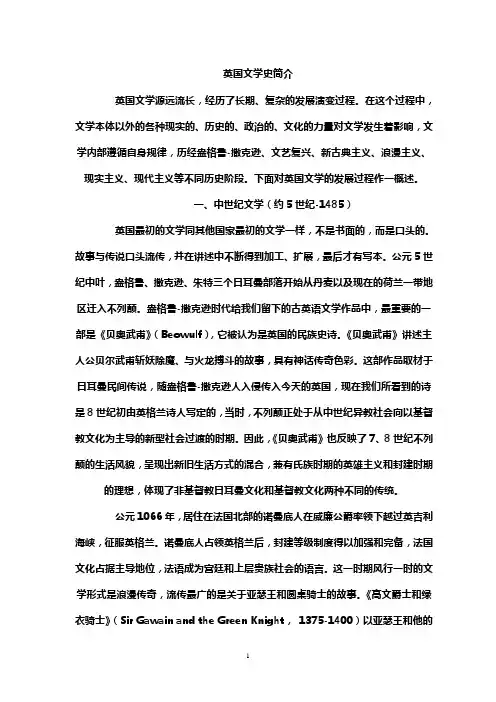
英国文学史简介英国文学源远流长,经历了长期、复杂的发展演变过程。
在这个过程中,文学本体以外的各种现实的、历史的、政治的、文化的力量对文学发生着影响,文学内部遵循自身规律,历经盎格鲁-撒克逊、文艺复兴、新古典主义、浪漫主义、现实主义、现代主义等不同历史阶段。
下面对英国文学的发展过程作一概述。
一、中世纪文学(约5世纪-1485)英国最初的文学同其他国家最初的文学一样,不是书面的,而是口头的。
故事与传说口头流传,并在讲述中不断得到加工、扩展,最后才有写本。
公元5世纪中叶,盎格鲁、撒克逊、朱特三个日耳曼部落开始从丹麦以及现在的荷兰一带地区迁入不列颠。
盎格鲁-撒克逊时代给我们留下的古英语文学作品中,最重要的一部是《贝奥武甫》(Beowulf),它被认为是英国的民族史诗。
《贝奥武甫》讲述主人公贝尔武甫斩妖除魔、与火龙搏斗的故事,具有神话传奇色彩。
这部作品取材于日耳曼民间传说,随盎格鲁-撒克逊人入侵传入今天的英国,现在我们所看到的诗是8世纪初由英格兰诗人写定的,当时,不列颠正处于从中世纪异教社会向以基督教文化为主导的新型社会过渡的时期。
因此,《贝奥武甫》也反映了7、8世纪不列颠的生活风貌,呈现出新旧生活方式的混合,兼有氏族时期的英雄主义和封建时期的理想,体现了非基督教日耳曼文化和基督教文化两种不同的传统。
公元1066年,居住在法国北部的诺曼底人在威廉公爵率领下越过英吉利海峡,征服英格兰。
诺曼底人占领英格兰后,封建等级制度得以加强和完备,法国文化占据主导地位,法语成为宫廷和上层贵族社会的语言。
这一时期风行一时的文学形式是浪漫传奇,流传最广的是关于亚瑟王和圆桌骑士的故事。
《高文爵士和绿衣骑士》(Sir Gawain and the Green Knight,1375-1400)以亚瑟王和他的骑士为题材,歌颂勇敢、忠贞、美德,是中古英语传奇最精美的作品之一。
传奇文学专门描写高贵的骑士所经历的冒险生活和浪漫爱情,是英国封建社会发展到成熟阶段一种社会理想的体现。
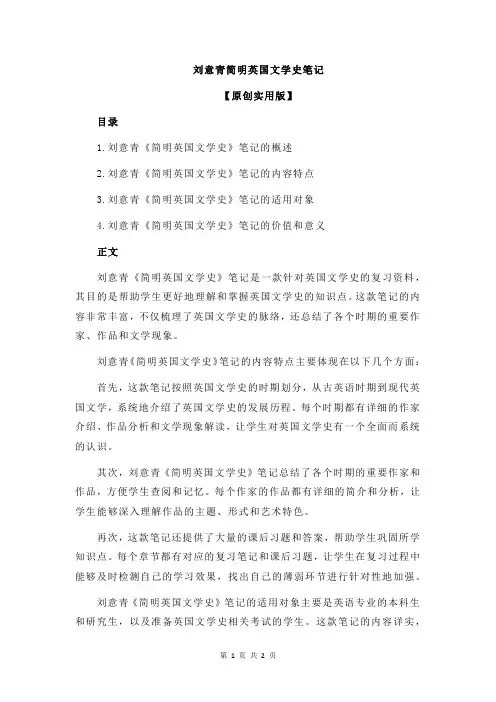
刘意青简明英国文学史笔记
【原创实用版】
目录
1.刘意青《简明英国文学史》笔记的概述
2.刘意青《简明英国文学史》笔记的内容特点
3.刘意青《简明英国文学史》笔记的适用对象
4.刘意青《简明英国文学史》笔记的价值和意义
正文
刘意青《简明英国文学史》笔记是一款针对英国文学史的复习资料,其目的是帮助学生更好地理解和掌握英国文学史的知识点。
这款笔记的内容非常丰富,不仅梳理了英国文学史的脉络,还总结了各个时期的重要作家、作品和文学现象。
刘意青《简明英国文学史》笔记的内容特点主要体现在以下几个方面:首先,这款笔记按照英国文学史的时期划分,从古英语时期到现代英国文学,系统地介绍了英国文学史的发展历程。
每个时期都有详细的作家介绍、作品分析和文学现象解读,让学生对英国文学史有一个全面而系统的认识。
其次,刘意青《简明英国文学史》笔记总结了各个时期的重要作家和作品,方便学生查阅和记忆。
每个作家的作品都有详细的简介和分析,让学生能够深入理解作品的主题、形式和艺术特色。
再次,这款笔记还提供了大量的课后习题和答案,帮助学生巩固所学知识点。
每个章节都有对应的复习笔记和课后习题,让学生在复习过程中能够及时检测自己的学习效果,找出自己的薄弱环节进行针对性地加强。
刘意青《简明英国文学史》笔记的适用对象主要是英语专业的本科生和研究生,以及准备英国文学史相关考试的学生。
这款笔记的内容详实,
既适合初学者入门学习,也适合有一定基础的学生进行深入研究和复习。
总之,刘意青《简明英国文学史》笔记是一款非常有价值的英国文学史学习资料。
它不仅内容丰富,而且条理清晰,能够帮助学生更好地理解和掌握英国文学史的知识点。
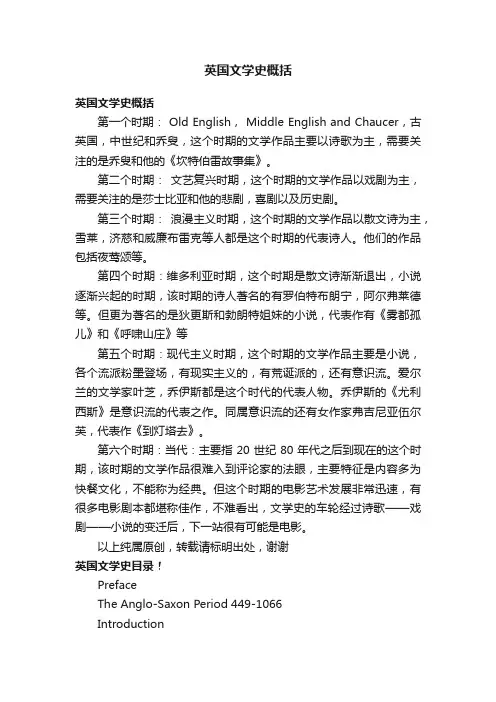
英国文学史概括英国文学史概括第一个时期: Old English, Middle English and Chaucer,古英国,中世纪和乔叟,这个时期的文学作品主要以诗歌为主,需要关注的是乔叟和他的《坎特伯雷故事集》。
第二个时期:文艺复兴时期,这个时期的文学作品以戏剧为主,需要关注的是莎士比亚和他的悲剧,喜剧以及历史剧。
第三个时期:浪漫主义时期,这个时期的文学作品以散文诗为主,雪莱,济慈和威廉布雷克等人都是这个时期的代表诗人。
他们的作品包括夜莺颂等。
第四个时期:维多利亚时期,这个时期是散文诗渐渐退出,小说逐渐兴起的时期,该时期的诗人著名的有罗伯特布朗宁,阿尔弗莱德等。
但更为著名的是狄更斯和勃朗特姐妹的小说,代表作有《雾都孤儿》和《呼啸山庄》等第五个时期:现代主义时期,这个时期的文学作品主要是小说,各个流派粉墨登场,有现实主义的,有荒诞派的,还有意识流。
爱尔兰的文学家叶芝,乔伊斯都是这个时代的代表人物。
乔伊斯的《尤利西斯》是意识流的代表之作。
同属意识流的还有女作家弗吉尼亚伍尔芙,代表作《到灯塔去》。
第六个时期:当代:主要指20世纪80年代之后到现在的这个时期,该时期的文学作品很难入到评论家的法眼,主要特征是内容多为快餐文化,不能称为经典。
但这个时期的电影艺术发展非常迅速,有很多电影剧本都堪称佳作,不难看出,文学史的车轮经过诗歌——戏剧——小说的变迁后,下一站很有可能是电影。
以上纯属原创,转载请标明出处,谢谢英国文学史目录!PrefaceThe Anglo-Saxon Period 449-1066IntroductionThe Venerable Bede and Caedmon King Alfred the GreatBeowulfThe Exeter BookThe Medieval Period 1066 -1485 IntroductionMedieval RomanceFolk BalladsJohn Wycliffe and William Langland Drama in the Middle AgesGeoffrey ChaucerThe Elizabethan Age 1485-1625 IntroductionThomas MoreSir Philip SidneyEdmund SpenserChrisher Marlowe and Sir Walter Raleigh Minor PlaywrightsWilliam ShakespeareFrancis BaconKing James BibleThe Seventeenth Century 1625-1700 IntrodutionBen Jonson and the Cavalier Poets John Donne and the Metaphysical Poets John MiltonJohn BunyanJohn DrydenThe Age of Neo-Classici *** 1700-1764 IntroductionAlexander PopeJonathan SwiftRichard Steele and Joseph AddisonSamuel Johnson and James BoswellThe Novel of the Eighteenth CenturyDaniel DefoeSamuel RichardsonHenry FieldingTobias SmollettLaurence SterneOliver Gold *** ithPre-Romantic Period 1764-1798IntroductionHorace WalpoleAnn RadcliffeThomas GrayRobert BurnsWilliam BlakeThe Romantic Age 1798-1837IntroductionWilliam WordsworthSamuel Taylor Coleridge……The Victorian Age 1837-1901The Modernist Age 1901-1945The Postmodern Period 1945-Present BibliographyIndex……关于英国文学史刘柄善的那本《英国文学史》上说,维多利亚时期是英国现实主义小说的巅峰时期,代表人物就是狄更斯,而当时英国之所以掀起现实主义风潮,则是因为此前的18世纪到19世纪初期,浪漫主义风靡英国,雪莱,济慈等人的诗歌风花雪月,让人一时忘却了现实,但随着浪漫褪去,人们又重归现实,于是狄更斯等人的现实主义作品,如《雾都孤儿》,《大卫科波菲尔》等书得以广为流传。
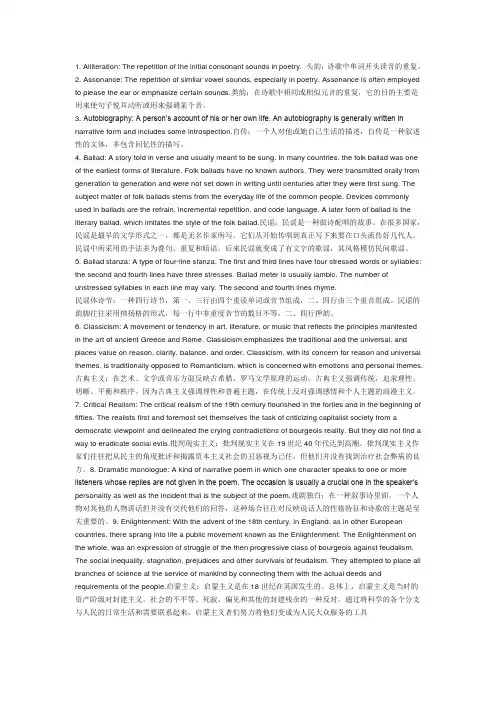
1. Alliteration: The repetition of the initial consonant sounds in poetry. 头韵:诗歌中单词开头读音的重复。
2. Assonance: The repetition of similar vowel sounds, especially in poetry. Assonance is often employed to please the ear or emphasize certain sounds.类韵:在诗歌中相同或相似元音的重复,它的目的主要是用来使句子悦耳动听或用来强调某个音。
3. Autobiography: A person’s account of his or her own life. An autobiography is generally written in narrative form and includes some introspection.自传:一个人对他或她自己生活的描述,自传是一种叙述性的文体,多包含回忆性的描写。
4. Ballad: A story told in verse and usually meant to be sung. In many countries, the folk ballad was one of the earliest forms of literature. Folk ballads have no known authors. They were transmitted orally from generation to generation and were not set down in writing until centuries after they were first sung. The subject matter of folk ballads stems from the everyday life of the common people. Devices commonly used in ballads are the refrain, incremental repetition, and code language. A later form of ballad is the literary ballad, which imitates the style of the folk ballad.民谣:民谣是一种做诗配唱的故事。
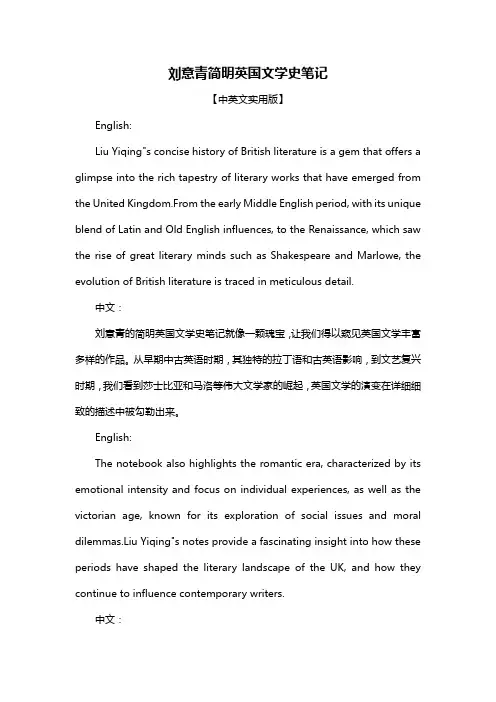
刘意青简明英国文学史笔记【中英文实用版】English:Liu Yiqing"s concise history of British literature is a gem that offers a glimpse into the rich tapestry of literary works that have emerged from the United Kingdom.From the early Middle English period, with its unique blend of Latin and Old English influences, to the Renaissance, which saw the rise of great literary minds such as Shakespeare and Marlowe, the evolution of British literature is traced in meticulous detail.中文:刘意青的简明英国文学史笔记就像一颗瑰宝,让我们得以窥见英国文学丰富多样的作品。
从早期中古英语时期,其独特的拉丁语和古英语影响,到文艺复兴时期,我们看到莎士比亚和马洛等伟大文学家的崛起,英国文学的演变在详细细致的描述中被勾勒出来。
English:The notebook also highlights the romantic era, characterized by its emotional intensity and focus on individual experiences, as well as the victorian age, known for its exploration of social issues and moral dilemmas.Liu Yiqing"s notes provide a fascinating insight into how these periods have shaped the literary landscape of the UK, and how they continue to influence contemporary writers.中文:笔记还突出了浪漫主义时期,其特点是对情感强度和个体经验的关注,以及维多利亚时代,以其探讨社会问题和道德困境而闻名。
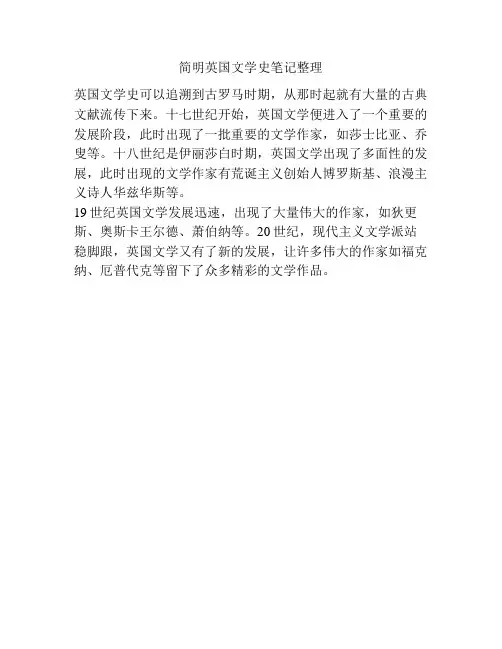
简明英国文学史笔记整理
英国文学史可以追溯到古罗马时期,从那时起就有大量的古典文献流传下来。
十七世纪开始,英国文学便进入了一个重要的发展阶段,此时出现了一批重要的文学作家,如莎士比亚、乔叟等。
十八世纪是伊丽莎白时期,英国文学出现了多面性的发展,此时出现的文学作家有荒诞主义创始人博罗斯基、浪漫主义诗人华兹华斯等。
19世纪英国文学发展迅速,出现了大量伟大的作家,如狄更斯、奥斯卡王尔德、萧伯纳等。
20世纪,现代主义文学派站稳脚跟,英国文学又有了新的发展,让许多伟大的作家如福克纳、厄普代克等留下了众多精彩的文学作品。
英国文学史(启蒙运动时期)这个部分讲启蒙运动(The Enlightenment Movement)时期的文学,还是照常,先提历史和文学背景,看看英国什么情况。
一、历史背景18世纪的英国,刚刚经历过资产阶级革命,也就是光荣革命(1688),光荣革命制宪,英国政体由君主专制转化为君主立宪,大权从国王手中落到了议会手上,资本主义发展迅速,资产阶级地位很高,而且18世纪英国开始了工业革命,在思想上面强调理性,这也是启蒙的主旨,那么文学上也会发生相应的改变,上个时期主要是德莱顿的古典主义文学时期,启蒙运动一开,文学基本就变为宣扬思想的武器,随着启蒙的深入,作家们也开始逐渐抛弃这种文学风格。
当然,18世纪初期古典主义还是在的,但是受启蒙思想的影响,古典主义变成了新古典主义(Neo-classicism),代表人物就是亚历山大·蒲伯(Alexander Pope),这货受德莱顿影响很大,后面具体说。
同时,这一时期有另一种文学体裁出现了,就是随着17世纪的报刊文学(大多都是写实小说)的发展,到了18世纪,逐渐演变成了小说,可以说是原来散文的一种变体。
这个时期的小说一般是现实主义小说,这些玩意都具有启蒙性质,初期的现实注意小说流浪汉题材(Picaresque Novel)很流行90,诗歌方面就是依旧是英雄双行体(heroic couplet)这种诗歌形式,始于乔叟,中间又经马洛、斯宾塞发展,最后到蒲伯手里有个完善。
戏剧上面那,过去都是以无韵诗为体的戏剧,18世纪改用偶句诗,时间地点格式上得到了统一。
总的来说18世纪的文学可以分为三个阶段:第一阶段主要新古典主义文学+报刊文学(就是写在报纸上的那种散文性质的文章)+现实主义小说,第二阶段:现实主义小说得到巨大发展,第三阶段,由于启蒙运动搞革命没有出现启蒙思想家想象中的理想社会,整个英国陷入一种充满悲观情绪的状态,这个时候感伤主义文学(Sentimentalism)和前浪漫主义时期(Pre-Romanticism)到来。
英国文学史简介谁给我说说英国文学史大致分为哪几个时期,每个时期的代表作家或诗人,他们的代表作是什么,是哪个派别的,大概归纳一下,快要考试了,考外研社出版的《英国文学史及选读》,一二册全考。
回答有用追加100分一、中世纪文学(约5世纪-1485)英国最初的文学同其他国家最初的文学一样,不是书面的,而是口头的。
故事与传说口头流传,并在讲述中不断得到加工、扩展,最后才有写本。
公元5世纪中叶,盎格鲁、撒克逊、朱特三个日耳曼部落开始从丹麦以及现在的荷兰一带地区迁入不列颠。
二、文艺复兴时期文学(15世纪后期-17世纪初)相对于欧洲其他国家来说,英国的文艺复兴起始较晚,通常认为是在15世纪末。
文艺复兴时期形成的思想体系被称为人文主义,它主张以人为本,反对中世纪以神为中心的世界观,提倡积极进取、享受现世欢乐的生活理想。
托马斯·莫尔(thomas more,1478-1535)是英国最主要的早期人文主义者,他的《乌托邦》(utopia)批评了当时的英国和欧洲社会,设计了一个社会平等、财产公有、人们和谐相处的理想国。
《乌托邦》开创了英国哲理幻想小说传统的先河。
文艺复兴时期诗歌创作繁荣,埃德蒙·斯宾塞(edmund spenser,1552-1599)的长诗《仙后》(the faerie queene)歌颂女王,宣扬人文主义思想。
他创造的"斯宾塞诗体"每节诗有九行,韵律复杂,具有柔和动听、萦绕耳际的音乐性。
弗兰西斯·培根(francis bacon,1561-1626)是这一时期最重要的散文家,他对文学的主要贡献是《论说文集》(essays),共58篇。
英国文艺复兴时期最杰出的作家是威廉·莎士比亚,他的全部作品包括两首长诗,154首十四行诗和38部(一说39部)戏剧。
三、17世纪文学约翰·弥尔顿(john milton,1608-1674)的长诗《失乐园》(paradise lost)和《复乐园》(paradise regained)、诗剧《力士参孙》(samson agonistes)。
英国文学史简介英国文学史简介楼主一、中世纪文学(约5世纪-1485)英国最初的文学同其他国家最初的文学一样,不是书面的,而是口头的。
故事与传说口头流传,并在讲述中不断得到加工、扩展,最后才有写本。
公元5世纪中叶,盎格鲁、撒克逊、朱特三个日耳曼部落开始从丹麦以及现在的荷兰一带地区迁入不列颠。
盎格鲁-撒克逊时代给我们留下的古英语文学作品中,最重要的一部是《贝奥武甫》(beowulf),它被认为是英国的民族史诗。
《贝奥武甫》讲述主人公贝尔武甫斩妖除魔、与火龙搏斗的故事,具有神话传奇色彩。
这部作品取材于日耳曼民间传说,随盎格鲁-撒克逊人入侵传入今天的英国,现在我们所看到的诗是8世纪初由英格兰诗人写定的,当时,不列颠正处于从中世纪异教社会向以基督教文化为主导的新型社会过渡的时期。
因此,《贝奥武甫》也反映了7、8世纪不列颠的生活风貌,呈现出新旧生活方式的混合,兼有氏族时期的英雄主义和封建时期的理想,体现了非基督教日耳曼文化和基督教文化两种不同的传统。
二、文艺复兴时期文学(15世纪后期-17世纪初)相对于欧洲其他国家来说,英国的文艺复兴起始较晚,通常认为是在15世纪末。
文艺复兴时期形成的思想体系被称为人文主义,它主张以人为本,反对中世纪以神为中心的世界观,提倡积极进取、享受现世欢乐的生活理想。
托马斯·莫尔(Thomas more, 1478-1535)是英国最主要的早期人文主义者,他的《乌托邦》(utopia)批评了当时的英国和欧洲社会,设计了一个社会平等、财产公有、人们和谐相处的理想国。
utopia现已成为空想主义的代名词,但乌托邦是作者对当时社会状况进行严肃思考的结果。
《乌托邦》开创了英国哲理幻想小说传统的先河,这一传统从培根的《新大西岛》(the new Atlantis)、斯威夫特的《格列佛游记》(gulliver's travels)、勃特勒的《埃瑞璜》(erewhon)一直延续到20世纪的科幻小说。
英国文学简史_概述中文翻译1、大不列颠人(英国人)在开始学习英国文学史之前,了解一下英国这个民族是很必要的。
英国这个民族是一个混血族。
早期居住在这个岛上的居民是凯尔特人的一个部落,我们现在称它为大不列颠人。
大不列颠人把这个岛屿命名为大不列颠岛,凯尔特人是其原始居民。
他们分为几十个小部落,每个部落都以小屋群居为主。
“最古老的凯尔特人法律今天归结起来显示出氏族任然充满着生命力”。
英国人曾生活在部落社会。
2、罗马人的占领在公元前55年,大不列颠岛被罗马征服者凯撒入侵,而这是的凯撒刚刚占领了高卢。
但是罗马人刚登上大不列颠岛海岸时,就遭到了在首领领导下的大不列颠人的狮子般疯狂的反击,随着罗马将领来来往往的这个世纪,直到公元78年英国从被于罗马帝国完全征服过。
伴随着罗马人的侵略占领,罗马式的生活方式也开始融入英国。
罗马式剧院和澡堂很快的在城镇中兴起。
而这些高雅的文明只不过是罗马侵略者的娱乐享受方式罢了,大不列颠人民却像奴隶一样被压迫着。
罗马人的占领持续了将近400年,在这期间,罗马人因其军事目的在岛上修建了后来被称之为罗马路的纵横交错的公路,这些公路在后期发展中起到了很大的作用。
沿着这些公路开始建立起大量的城镇,伦敦就是其中之一,开始成为重要的贸易中心城市。
罗马的占领也带来了基督教文化。
但是在15世纪初期,罗马帝国处于逐渐的衰落阶段。
公元410年,所有罗马军队撤回欧洲大陆再也没有返回。
因此,也标志这罗马人占领的结束。
3、英国人的占领同时,大不列颠也被成群的海盗给侵略着。
他们是来自北欧的三个部落:盎格鲁人,撒克逊人和朱特人民族。
这三个部落在大不列颠海岸登路,把大不列颠人民赶到西部和北部,然后自己定居下来。
朱特人占领了岛屿东南部的肯特。
撒克逊人占领了岛屿南部地区,并建立起像韦塞克斯,埃塞克斯和东萨塞克斯这样的小王国。
盎格鲁人席卷了东部中部地区,并在东英吉利亚建立王国。
七个像这样的王国在大不列颠岛上逐渐出现。
到公元7世纪,这些小王国开始合并成为今天称为英格兰的统一王国,或被称作盎格鲁人之国。
Quiz (1)1.The first settlers of the British Isles were Celt, and Britain got its name from a branch of thispeople called Briton. But later they were driven to live in Scotland, Wales and Ireland.不列颠群岛的第一批定居者是凯尔特人,Britain的叫法则就是来源于他们的一个叫做Briton(不列颠人)的分支。
但后来他们被驱赶到苏格兰,威尔士和爱尔兰居住。
2.The Angles, Saxons and Jutes were Germanic tribes originally living on the Continent. Theymoved to the British Isles and became the ancestors of the English people.盎格鲁人、撒克逊人和朱特人是最初居住在大陆的日耳曼部落。
他们搬到不列颠群岛,成为英国人的祖先。
3.The most important event of the Old English Period was Norman Conquest, which tookplace in the year 1066.古英语时期最重要的事件是1006年发生的诺尔曼征服。
4.The Roman Catholic Church sent St. Augustine to England in 597 to convert the Englishpeople to Catholicism.罗马天主教会于597年将圣奥古斯丁派遣到英格兰,使英国人皈依天主教。
two poems of this period apart from Beowulf: Widsith, and The Seafarer.请列出这段时期的除了《贝奥武夫》两首诗:Widsith(威德西斯)和The Seafarer(水手) 6.Beowulf is an epic of Alliterative lines, and it tells the events that took place on theContinent before they moved to the British Isles.贝奥武甫(Beowulf)是一首头韵体裁的史诗,它讲述了在大陆迁移到不列颠群岛之前发生的事件。